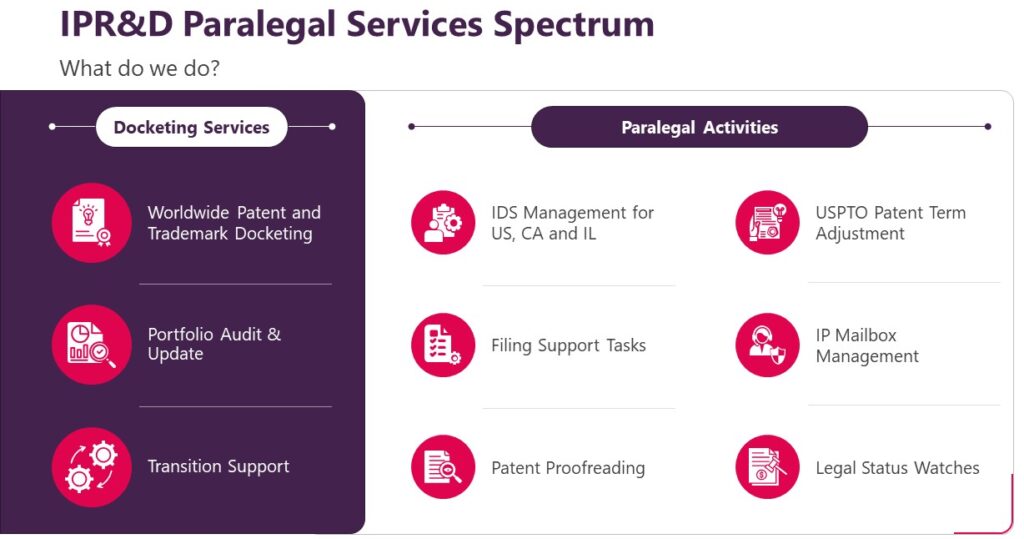Effective management systems are paramount in the ever-evolving intellectual property (IP) landscape. Businesses constantly seek ways to optimize their IP operations to safeguard their assets and streamline processes. This approach is where paralegal support and robust IP management systems (IPMS) come into play. They offer a blend of technical and administrative expertise, ensuring seamless operation and strategic advantage. By leveraging IP paralegal services, businesses can enhance their IP management through tailored support in patent prosecution and trademark analysis.
Executive Summary
This blog explores the pivotal role of IPMS and paralegal support in optimizing IP operations. Key insights include the core functions of IPMS, the benefits of independent service providers, and the strategic advantages of integrated IP solutions. By leveraging these tools and services, businesses can drive efficiency, ensure compliance, and maintain a competitive edge in the IP landscape.
Core Functions of Intellectual Property Management Systems
At their core, IP management systems function similarly to databases, facilitating the management of patent and trademark data. These systems offer essential capabilities such as data search, updates, report generation, and insight extraction. For example, global companies provide IPMS solutions that support these fundamental tasks. These systems ensure that IP departments remain current, enabling them to efficiently manage their patent and trademark portfolios.
According to Skyquest, the global intellectual property management software market was valued at USD 6.54 billion in 2019 and USD 7.57 billion in 2019, and it is expected to reach a value of USD 24.41 billion by 2031, at a CAGR of more than 15.76% over the forecast period (2024-2031). This significant growth underscores the increasing importance of effective IP management solutions in the modern business landscape.
Benefits of Paralegal Support in IP Management
Increased Efficiency
Paralegal support services are a key component of intellectual property management, significantly boosting efficiency across various IP operations. Skilled paralegals help law firms and IP owners streamline their workflows, reducing the time spent on administrative tasks and allowing them to focus on high-value activities that require specialized expertise. By outsourcing tasks such as docketing, data verification, and invoice management, corporate enterprises can free up their in-house teams to concentrate on strategic decision-making, patent drafting, and prosecution. This strategic focus on high-value activities not only enhances productivity but also ensures that professionals with the necessary expertise handle critical tasks.
Cost Savings
Intellectual property paralegal services offer substantial cost-saving benefits for law firms and IP owners. By outsourcing tasks to specialized paralegal teams, IP organizations can avoid the expenses associated with hiring and training in-house staff, investing in costly software and technology, and managing potential errors and inaccuracies. Paralegal support services help optimize IP portfolios, identify opportunities for cost savings, and develop strategies to reduce expenses without compromising the quality of IP management. This cost-effective approach allows businesses to allocate resources more efficiently and focus on core activities that drive innovation and growth.
Improved Accuracy
Accuracy is paramount in IP management, and paralegal support services excel in this area. Skilled paralegals meticulously review and verify data, ensure compliance with regulatory requirements, and conduct thorough prior art searches to identify relevant patent and non-patent literature. By outsourcing these tasks to specialized paralegal teams, IP organizations can ensure that their IP management tasks are completed precisely and efficiently. This reduces the risk of errors and inaccuracies that could compromise the validity of their IP rights, providing peace of mind and safeguarding valuable intellectual property assets.
The Transition to New Systems
Switching from one IPMS to another is often a complex and challenging for organizations. This difficulty stems from the IPMS being deeply embedded within the operations of an IP department. As a result, any change requires migrating all existing data, updating deadlines, redesigning workflows, and retraining staff on the new system. Despite these challenges, our flexibility and expertise ensure a smoother transition, minimizing disruptions and ensuring seamless integration of the new IPMS.
Similarly, the core functionalities of IPMS, such as data searching and reporting, remain consistent across different platforms. This analogy helps demystify the transition process for clients, emphasizing that while there may be an adjustment period, the fundamental operations will stay familiar.
The Role of Independent Service Providers
One significant advantage of working with independent service providers is their ability to offer unbiased insights into various IPMS. Internal employees of IPMS vendors may be restricted in their ability to discuss system shortcomings, while independent providers can openly discuss strengths and weaknesses. This transparency allows decision-making and fosters continuous system improvement.
Many corporate studies show that businesses that engage independent service providers report higher satisfaction levels due to the unbiased evaluation and tailored recommendations they receive. This independent oversight ensures companies promptly address system inefficiencies and optimize their IP management strategies.
Integration with Other Systems
Another critical aspect of modern IPMS is their ability to integrate with other systems through API access. This integration enables seamless operations, such as automatic patent renewals and real-time data synchronization. For example, some systems can integrate with various renewal providers, ensuring that patent renewals happen without manual intervention. This automation enhances overall efficiency.
Dashboards and Reports
Moreover, advanced IPMS offers sophisticated dashboards and reporting tools that aid IP department heads in reviewing their portfolios and making strategic decisions. These tools provide real-time insights into IP assets, helping businesses identify opportunities for innovation and areas needing attention.
The Necessity of Expert Management
Despite the robustness of modern IPMS, expert management remains crucial. Just as IT departments rely on help desks to manage hardware and software issues, IP departments need skilled professionals to operate and maintain their IPMS. Whether through internal staff or external service providers, having knowledgeable individuals to manage the system ensures that all data is up-to-date and that the department functions smoothly.
Our survey with existing clients underscores this necessity. It reveals that organizations with dedicated IP management teams or service providers experience fewer operational disruptions and greater compliance with regulatory requirements. These teams or providers handle routine tasks, address system issues promptly, and provide strategic insights that drive better IP management.
Paralegal Support Services by Evalueserve
Evalueserve’s paralegal support services stand out in the IP landscape, offering comprehensive solutions that cater to the diverse needs of IP departments. Their services include docketing support, patent and trademark filing support, and administrative assistance, ensuring that all aspects of IP management are covered.
Key Features of Evalueserve’s Paralegal Support:
- Docketing Support: Evalueserve offers meticulous docketing support, helping businesses track essential deadlines and maintain accurate records. This service is crucial for avoiding lapses in patent and trademark protections.
- Filing Assistance: Evalueserve provides end-to-end support for patent and trademark filings, from preparing necessary documents to ensuring compliance with regulatory requirements. This service streamlines the filing process and reduces administrative burden.
- Administrative Assistance: Evalueserve’s paralegal team handles various administrative tasks, including correspondence management, document preparation, and data entry. This step frees up internal resources, allowing businesses to focus on strategic initiatives.
You can read more about it in my previous blog.

Conclusion
In conclusion, integrating paralegal support and advanced IPMS enhances the efficiency and effectiveness of IP management. Businesses can ensure that their IP portfolios are managed seamlessly by leveraging the expertise of independent service providers and utilizing systems with robust integration capabilities. This strategic approach safeguards valuable IP assets and positions companies for sustained innovation and competitive advantage.
For businesses navigating the complexities of IP management, partnering with experienced providers and investing in state-of-the-art systems is not just necessary—it's a strategic imperative that can drive long-term success.
Actionable Recommendations
- Evaluate your current IPMS to identify gaps and inefficiencies.
- Partnering with independent service providers offers unbiased IPMS evaluations and reduces dependence on a single provider..
- Invest in training for your IP management team to fully leverage advanced IPMS features.
By implementing these strategies, businesses can optimize their IP operations and maintain a competitive edge in the dynamic IP landscape.
Talk to One of Our Experts
Get in touch today to find out about how Evalueserve can help you improve your processes, making you better, faster and more efficient.


